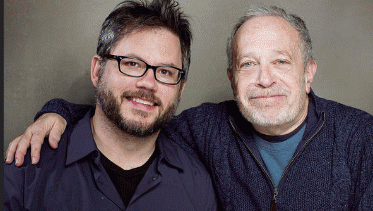with Reich at Sundance Film Festival in January by Victoria Will/Invision/AP
Welcome back for the conclusion of my interview with Jacob Kornbluth, producer/director of Inequality for All.
JB: We were talking about the various economic
factors you tracked for the film. Please tell us more about
what you discovered, Jake. Even though these other factors weren't
included in the film, it's really important for us to know in order
to understand the truly far-reaching ramifications of income
inequality.
JK: A lot of this is covered in a book called The Spirit Level by Richard Wilkenson and Kate Pickett. Those looking for an intro to the topic can see a TED Talk that Wilkenson gave on the material.
We may need to wait a few years before all of the research is verified, but it is certainly thought provoking and powerful to think of all the ways income inequality affects us.
I'm a filmmaker, and I process things visually. What really hit me with this project was two "shapes" that I kept seeing over and over. One was the "suspension bridge" graph as I said before, this showed things that tracked with income inequality. But the other thing I kept seeing was what I thought of as "the wedge". This is the graph that tracks a divergence from income and wages. The root of this is that since the 1970s, GDP in the US has more than doubled -- so the economy as a whole has done really well. And Productivity -- the stuff workers produced -- has gone up as well. But wages have been flat since the 1970s, so as the other lines go up this one stays flat and it creates a "wedge" shape. I kept seeing that shape over and over as well.
I viscerally feel the impacts of those two shapes almost every day. This isn't just an economy that is structurally out of whack, it's our whole society. As Bob told me early on, the study of economics is relatively new -- just about 100 years. Before that, those studying what we now call economics were call "political economists". Before that, when Adam Smith wrote The Wealth Of Nations, he called himself a "moral philosopher". The idea is that at the heart of all the graphs and numbers we now call "economics" is one question: "What is a good society?"

Jake at work
by Kornbluth's website
JB: That is the $64,000 question. In one of the videos you and Bob made prior to the 2012 campaign, he had a great one liner: "With so much income and wealth now at the top, the rest of us no longer have the purchasing power to keep the economy going." That's another way of saying the same thing. What we have going on now does not benefit our society as a whole or even those at the very top. Which brings me to Nick Hanauer. Please tell our readers about him and how he came to be in Inequality for All.
JK: Nick Hanauer is a wealthy venture capitalist based out of Seattle. He says in the film that he makes "between 10 million and 30 million a year". He is a passionate capitalist -- so, many assume, must be lobbying and pushing to get as big of a piece of the economic pie as possible. As it turns out, that's only partially true. He certainly is trying to make as much money as he can, given the current rules of our capitalist system. But he also believes widening economic inequality is the biggest issue of our times and a terrible problem for our economy.
His point of view turns the usual framing of class struggle between the rich and everyone else inside out. Nick believes that widening income inequality needs fixing because if more of the middle class has money to buy stuff, as a savvy business man, he could then figure out more things to sell to them. It's a bit counterintuitive, but (as you alluded to in your question) Nick is smart enough to see past what might SEEM like his self-interest to see the bigger picture: He gets that if the middle class has more purchasing power, that'll help the overall economy grow and be good for him. There is no "us" vs "them"; we're all in this together and widening income inequality hurts us all.
I should say that lots of wealthy people understand that strengthening the middle class, which is good for the overall economy, is good for them as well. Warren Buffett, for instance, has been quite outspoken on the topic.

venture capitalist Nick Hanauer by "Inequality for All"
I was searching for a character like Nick -- a wealthy individual who was both a passionate capitalist and a passionate advocate that widening income inequality was bad for us all. I had seen a TED Talk that Nick had given, and read an article in (I believe) GQ that he had been quoted in. I just gave him a call, he agreed to talk, and we showed up with a camera and started talking. I had a sense when I was talking to him just how surprising and brave it was to have a wealthy guy speak so honestly about his own finances, and then to be articulate enough at the same time to put this in a larger context was pretty special.
JB: I totally agree; Nick's appearance was definitely a high point of the film. I kept thinking, "Wow! Let's clone this guy!" Speaking of money, how did you get the financing for this project? That's always a challenge, I imagine.
(Note: You can view every article as one long page if you sign up as an Advocate Member, or higher).






